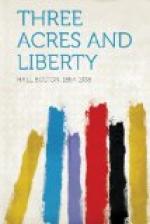The trustees of the State Agricultural College of New Jersey, at New Brunswick, have established winter courses in agriculture, open to all residents of New Jersey over sixteen years of age. Courses will be for twelve weeks, and only a small entrance fee is required; few books will be needed.
Other states are doing likewise; all will need many teachers and experimenters. At present all who know anything about intensive agriculture are snapped up by the numerous government experiment stations at good salaries. The land like that of the Rockefellers, the Paynes, the Cuttings, on which farming is carried on by unnecessarily expensive methods, needs the services of trained agriculturists and professional foresters. The Division of Forestry at the start employed eleven persons, but now it has in the field as many hundreds of employees, including a lot of trained foresters.
The railroads also see the profit in teaching farming, and are devoting more and more money to experiments and lectures to show the farmers that they can get more and better crops with the same effort by intelligent selection of seeds.
The Chicago, Burlington, and Quincy Railway Company ran its first Seed and Soil Special over the entire system in the winter of 1904-1905, and has lectured to hundreds of thousands of farmers since.
They report to us that “there is no doubt that the lectures did a great deal of good, and necessarily the larger increase of crops which followed is due to the scientific methods of farming expounded by the various professors.” The late President James J. Hill wrote much about the small farms’ large yields.
The hundreds of thousands of “war gardens” unskillfully conducted and glutting the local markets with crops all matured at about the same local time will unreasonably disgust many with intensive cultivation, especially those who work but do not think. The remedy is more instruction. The effect the agricultural colleges and experiment stations is plain to the eye in the better appearance of farms as we near the centers of instruction.
Some years ago a clergyman published a book upon the Adirondacks; it was full of poetry, and he sent men up there who afterwards became known as “Murray’s Fools.” They knew nothing about the life and had no suitability and little preparation for it. We do not wish to bring out a crop of “Three Acres and Liberty Fools.” We are telling what has been done and what can be done again. It does not follow that every man can or will do it, much less teach it or advance the art, but the field is a large one and holds out great promise to those who persevere and excel in it.
If any one thinks that the profit of the earth will come to the cultivator without very intelligent and steady work, he is mistaken. No owner of land, unless others require it to live upon, can make money by neglecting it.




